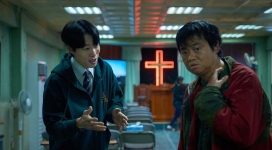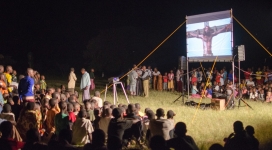Recently, President Donald Trump appointed evangelical Christian leader Jerry Falwell Jr. to head the White House education reform task force. Not much is known about the task force or what its work will be. And, tapping Falwell Jr. as its leader may seem odd to some observers given that he is president of Liberty University, a Christian university founded by his father, Jerry Falwell Sr., and not a top research university.
Falwell Jr. has recently been active in the political realm, particularly in his outspoken support of Donald Trump.
From my perspective as someone who has been studying Protestant fundamentalists and evangelicals for more than 20 years, Falwell Jr., to date, remains a relatively minor political and religious figure. His appointment could be better explained by his family legacy, particularly that of his late father, Jerry Falwell Sr. - an enormously influential figure in American politics still today.
From televangelist to political activist
Falwell Sr. was a pastor of Thomas Road Baptist Church, a fundamentalist Christian megachurch in Lynchburg, Virginia. Along with several other evangelical televangelists in the 1970s, he enjoyed a large national following who tuned in to his weekly televised church service.

Rev. Jerry Falwell in front of a scale model of Liberty Village on May 30, 2002 in Lynchburg, Virginia. AP Photo/R. David Duncan III
Coinciding with the popularity of Ronald Reagan, Falwell founded the Moral Majority in 1979 as a conservative Christian political lobbying group. Although the founding of the Moral Majority is popularly seen as an anti-abortion and pro-family movement, its real roots were different. Falwell and other evangelical leaders felt the federal government was overreaching with its guidelines into how Christian groups maintained racial restrictions in their schools.
The Moral Majority ultimately expanded its platform from segregation in schools to include what is now a familiar agenda: supporting and sponsoring legislation for "traditional" family values and prayer in schools. It also opposed LGBT rights, the Equal Rights Amendment, abortion and other similar social-moral issues.
Through his nationally televised church services, Falwell Sr. reached beyond his original followers to other groups that were in agreement with the conservative, pro-family, racial agenda of the Moral Majority.
Rise of the religious right
Scholars such as sociologist Martin Riesebrodt have argued that movements such as the Moral Majority were "patriarchal protest movements," intended to reestablish the leadership and authority of males in their families, in government and in religious institutions.
The emergence and popularity of the Moral Majority came at a time when there were growing efforts to establish the rights of women, people of color and the LGBTQ community. Moral Majority, thus, represented the conservative religious reaction to those efforts.
The Moral Majority drew primarily from white fundamentalist and evangelical Christians, although it also included conservative Catholics and mainline Protestants. It thus mobilized a broader conservative religious and political coalition than just white conservative evangelicals.
Throughout its 10 years of existence, the Moral Majority became a decisive and powerful force within conservative politics and the Republican Party. Falwell and the Moral Majority worked with other equally conservative evangelical and fundamentalist Christian leaders, such as James Dobson, Tim LaHaye, Pat Robertson, Phyllis Shlafly and the like. Ultimately, this broad coalition of conservatives - mostly white Christians - came to represent the "Religious Right." It has had an enormous impact on both the Republican Party and on public policy more generally since its founding.

President Reagan shakes hands with the Rev. Jerry Falwell, right, during a convention of National Religious Broadcasters on Jan. 30, 1984 in Washington. AP Photo/Ira Schwarz
For example, Republican candidates for office, dating back to Reagan and George H.W. Bush, recognized the power of the religious right as a voting bloc, and routinely visited evangelical and fundamentalist institutions such as Falwell's Liberty University and Bob Jones University in South Carolina.
Further, it was the efforts of the Moral Majority and other important organizations within the broader religious right - such as Schlafly's Eagle Forum and Dobson's Focus on the Family - that led to the defeat of legislation such as the Equal Rights Amendment and efforts to block legislation furthering LGBTQ rights. Similar issues echo today as well, presented in the guise of religious freedom for Christians.
Politics of morality
Political involvement was a shift for Falwell, who as a fundamentalist Christian avoided political organizing as a matter of religious conviction. Fundamentalists, as distinct from evangelicals, tended toward separation not only from other Christians who didn't share their particular brand of Christianity and its emphasis on theological, personal and social purity, but also from entanglements with the political world.
Thus, Falwell's move into politics also entailed a shift in his theological perspective. He moved from a separatist stance that taught that God controls everything, including politics, to one that required human action to fulfill God's intended destiny for America.
For Falwell, and the mostly white, conservative fundamentalist and evangelical Christian world that his movement represented, these political battles were moral and spiritual battles intended to save America from the moral quagmire that they believed it was becoming.
The Falwell legacy
Falwell died in 2007, and his efforts to combine his religious and political commitments seem to have fallen to his son, Jerry Falwell Jr., who as president of Liberty University has been outspoken in his support of Donald Trump. Trump, in turn, seems to have rewarded him for his support with the appointment to the education reform task force.
Falwell Jr. is as outspoken in his religiously glossed opinions on issues as was his father. Perhaps this is seen most famously in his support for Second Amendment rights, to the point of advocating that students at Liberty University carry guns. He even built a shooting range on campus.

Jerry Falwell Jr. speaks at the Republican National Convention in Cleveland, Ohio, July 21, 2016. Rick Wilking/Reuters
Yet, Falwell Jr. faces a different world than his father did. The core of the religious right activists is older. Its separatist and culture wars approach is less appealing to younger evangelicals - even to those who may generally agree with some of the positions put forth by Republicans and their older evangelical supporters.
Recent scholarship argues that the white Christian America upon which the religious right remains dependent is in decline. Yet, as exemplified by the over 80 percent of white evangelicals who voted for Donald Trump in the 2016 election, the legacy of Falwell Sr. lives on - at least for the near term - making him a figure as important as Reagan for the Republican Party.
Whether Falwell Jr. will rise to the level of influence attained by his father remains to be seen. But, he has signaled his goals for the education task force, which are similar to the issues that motivated Falwell Sr. in the 1970s. In an interview, for example, he said that he saw the goal of the task force to reduce "overreaching regulation" into the affairs of schools like Liberty University.
Much like Falwell Sr., his goal "is to pare it back and give colleges and their accrediting agencies more leeway in governing their affairs."
Richard Flory is the Senior Director of Research and Evaluation at the University of Southern California - Dornsife College of Letters, Arts and Sciences. This article first appeared in The Conversation.







